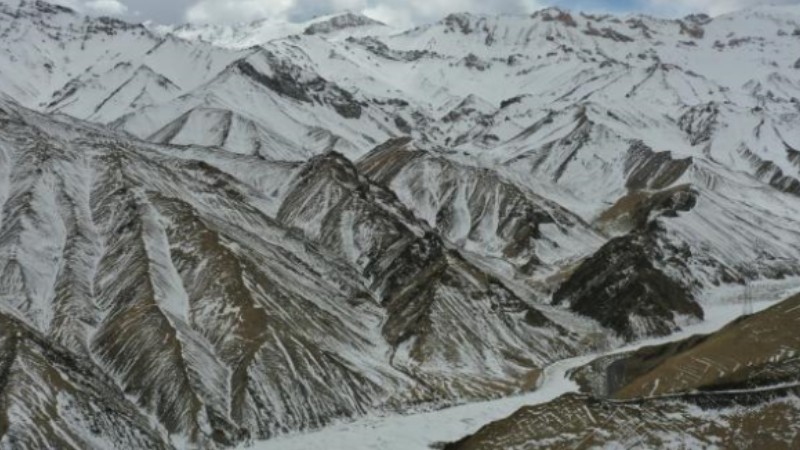Xinjiang to increase tech investment

Visitors browse agricultural products at the seventh China-Eurasia Expo in Urumqi, Xinjiang Uygur autonomous region, last year. [Photo/China News Service]
More inputs to facilitate high-quality development, accelerate opening-up
The Xinjiang Uygur autonomous region will boost investment in technology to support high-quality development while pushing for higher-level opening-up, the Party chief of the region said.
"With the support of resources, geological advantages and policies, the region should dare to think and act on technological innovation. It should also face difficulties head-on so it can come up from behind in the sector," Ma Xingrui, Party chief of Xinjiang, said during a panel discussion of the Xinjiang delegation at the 14th National People's Congress.
He said that the region's three-year plan to deepen structural reforms in the science and technology sector should be fully implemented. Also, development of core technologies should be enforced.
Xing Guangcheng, also an NPC deputy of the delegation and head of the Institute of Chinese Borderland Studies at the Chinese Academy of Social Sciences, said Ma has attached great importance to technological development and innovation, which are key to Xinjiang's quality development.
"Xinjiang is resource-rich, but such an advantage is no longer sufficient to support the region's quality development. The region must focus on developing high-tech industries, such as microchips," Xing said in an exclusive interview with China Daily. "More important, while the region modernizes its development path, the mindset of Xinjiang officials also must be adapted to new demands."
Ma also said that the region will push for a higher level of opening-up and implement a more proactive opening-up strategy. Furthermore, as a core area of the Silk Road Economic Belt, it will continue to boost development in economic zones and areas surrounding land ports as well as deepen cooperation with neighboring countries.
Xinjiang, which borders eight countries, was an important trade hub on the ancient Silk Road connecting China with Eurasian countries. Since President Xi Jinping proposed the Belt and Road Initiative in 2013, the region has made significant progress in functioning as the core area in the Silk Road Economic Belt, Xing said, thanks to transportation infrastructure that was significantly improved in the past decade. Most of the China-Europe freight trains exit China via land ports in Xinjiang and the efficiency has been greatly improved, he said.
In 2022, Xinjiang's export volume reached 246 billion yuan ($35.3 billion), an increase of 64.4 percent year-on-year while the import volume reached 37.2 billion yuan, an increase of 25.3 percent year-on-year, according to data from the local customs bureau.
"It's undeniable that rumors made up by Western anti-China forces on Xinjiang, such as the use of forced labor and carrying out genocide, have affected Xinjiang exploring global markets to a certain degree, but they didn't and won't affect Xinjiang's plan to steadily deepen opening-up and boost high-quality development," Xing said.
Meanwhile, achieving faster economic growth and enabling people from all ethnic groups to live a better life are the best ways to respond to such smearing, he added.
Xing said the region has reached a golden phase for development in the wake of terrorist and extremist activities having been successfully curbed, and there is no time to waste.
Xinjiang once experienced frequent terrorist attacks, which caused great harm to the lives and property of people from all ethnic groups. Since 2014, the region has stepped up efforts to root out terrorism and religious extremism.
"Having no sense of security is the last thing entrepreneurs and investors want to experience in a place. Now, the social situation in Xinjiang has stabilized and security concerns have become a thing of the past. The region needs to step up efforts in creating a good business environment to attract entrepreneurs," Xing said.
Ma, Party chief of the region, said at the panel discussion session that Xinjiang will continue to improve its business environment to support private businesses to thrive in Xinjiang and lighten their burdens.
Xinjiang will boost the development of the oil and gas, coal, grain, cotton, fruit and vegetable industries, which play a key role in China's economic development, Ma said.
Photos
Related Stories
- Farmers dig out grape vines in Xinjiang
- Dance drama inspired by cultural relic unearthed in NW China's Xinjiang staged in Urumqi
- Xinjiang's Alataw Pass port sees more freight train routes
- Nearly half of Xinjiang's arable land developed into high-standard farmland
- Scenery of Duku highway in snow-covered mountain in Xinjiang
- Construction begins on high-cost power grid project in Xinjiang
- Female truck driver witnesses decades of change in China's Xinjiang
- Uygur artists keep ethnic musical heritage alive in NW China’s Xinjiang
- 2023 Taklimakan Rally to resume in Xinjiang
- China's Xinjiang sees tourism rebound in first two months
Copyright © 2023 People's Daily Online. All Rights Reserved.









